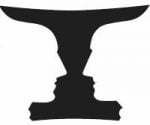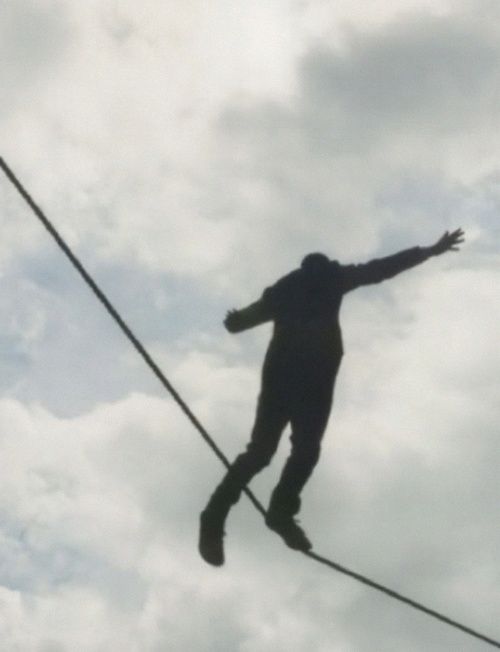THERE WERE TWO FRIENDS OF THE KING,
AND BOTH WERE PROVED GUILTY OF A CRIME.
SINCE HE LOVED THEM THE KING WANTED TO SHOW THEM MERCY,
BUT HE COULD NOT ACQUIT THEM BECAUSE EVEN A KING’S WORD
CANNOT PREVAIL OVER THE LAW.
SO HE GAVE THIS VERDICT:
A ROPE WAS TO BE STRETCHED OVER A DEEP CHASM,
AND, ONE AFTER ANOTHER, THE TWO WERE TO WALK ACROSS IT.
WHOEVER REACHED TO THE OTHER SIDE WAS TO BE GRANTED HIS LIFE.
IT WAS DONE AS THE KING ORDERED,
AND THE FIRST OF THE FRIENDS GOT SAFELY ACROSS.
THE OTHER, STILL STANDING ON THE SAME SPOT, CRIED TO HIM, ‘TELL
ME, FRIEND, HOW DID YOU MANAGE TO CROSS?’
THE FIRST CALLED BACK, ‘I DON’T KNOW ANYTHING BUT THIS:
WHENEVER I FELT MYSELF TOPPLING OVER TO ONE SIDE,
I LEANED TO THE OTHER.’
EXISTENCE is paradoxical; paradox is its very core. It exists through opposites, it is a balance in the opposites. And one who learns how to balance becomes capable of knowing what life is, what existence is, what God is. The secret key is BALANCE.
I have heard.
Do you know that on Noah’s ark, making love was forbidden while on board? When the couples filed out of the ark after the flood, Noah watched them leave. Finally the tom-cat and the she-cat left, followed by a number of very young kittens. Noah raised his eyebrows questioningly and the tom-cat said to him, ‘You thought we were fighting!’
Love is a sort of fight, love IS a fight. Without fight love cannot exist. They look opposite — because we think lovers should never fight. It is logical: if you love somebody how can you fight? It is absolutely clear, obvious to the intellect, that lovers should never fight — but they do. In fact, they are intimate enemies; they are continuously fighting. In that very fight the energy that is called LOVE is released, love transcends. The fight cannot destroy it. Love survives fight but it cannot exist without it.
Look into life: life is non-Aristotelian, non-Euclidean. If you don’t force your concepts on life, if you simply look at things as they are, then you will be suddenly surprised to see that opposites are complementary. And the tension between the opposites is the very basis on which life exists — otherwise it would disappear. Think of a world where death does not exist…. Your mind may say ‘then life will be there eternally’, but you are wrong.
If death does not exist life will simply disappear. It cannot exist without death; death gives it the background, death gives it colour and richness, death gives it passion and intensity.
So death is not against life — the first thing — death is involved in life. And if you want to live authentically you have to learn how to continuously die authentically. You have to keep a balance between birth and death and you have to remain just in the middle. That remaining in the middle cannot be a static thing: it is not that once you have attained to a thing — finished, then there is nothing to be done. That is nonsense. One never achieves balance forever, one has to achieve it again and again and again.
Meditation is not a static thing. It is a balance. You will have to attain it again and again and again. You will become more and more capable of attaining it, but it is not going to remain forever, like a possession in your hands. It has to be claimed each moment — only then is it yours. You cannot rest, Life does not believe in rest; it is a constant movement from perfection to more perfection.
Listen to me: from perfection to more perfection. It is never imperfect, it is always perfect, but always more perfection is possible. Logically these statements are absurd.
Now these are the two types of people.
The first simply got safely across. Ordinarily we would like to enquire how to go on a rope. A tightrope stretched over a chasm — it is dangerous. Ordinarily we would like to know the ways, the means, the method, how to go. We would like to know how? The technique — there must be a technique. For centuries people have walked on tightropes.
But the first one simply walked without enquiring, without even waiting for the other. This is the natural tendency: to let the other go first. At least you will be able to watch and observe and that will be helpful for you. No, the first simply walked. He must have been a man of tremendous trust; he must have been a man of undoubting confidence. He must have been a man who has learnt one thing in life: that there is only one way to learn and that is to live, to experience. There is no other way.
You cannot learn tightrope-walking by watching a tightrope-walker — no, never. Because the thing is not like a technology that you can observe from the outside, it is some inner balance that only the walker knows. And it cannot be transferred. He cannot just tell you about it; it cannot be verbalised.
The first man must have come to a deep understanding in his life — that life is not like a textbook. You cannot be taught about it, you have to experience it. And he must have been a man of tremendous awareness. He did not hesitate, he simply walked, as if he had always been walking on a tightrope. He had never walked before; it was for the first time.
But for a man of awareness everything is for the first time, and a man of awareness can do things — even when he is doing them for the first time — perfectly. His efficiency does not come out of his past, his efficiency comes out of his present. Let this be remembered.
You can do things in two ways. You can do something because you have done it before — so you know how to do it, you need not be present, you can simply do it in a mechanical way. But if you have not done it before, and you are going to do it for a first time, you have to be tremendously alert because now you don’t have any past experience. So you cannot rely on the memory, you have to rely on awareness.
These are the two sources of functioning: either you function out of memory, out of knowledge, out of the past, out of mind; or you function out of awareness, out of the present, out of no-mind.
The first man must have been a man of no-mind, a man who knows that you can simply be alert and go on and see what happens. And whatsoever happens is good. A great courage.
The second is the majority mind, the mass mind. The second wants to Know first how to cross it. Is there a method to it? Is there a technique to be learnt? He is waiting for the other to say.
‘TELL ME, FRIEND, HOW DID YOU MANAGE TO CROSS?’
The other must be a believer in knowledge. The other must have been a believer in others’ experiences. Waiting for others’ knowledge is waiting in vain because that which can be given by the others have no worth, and that which is of any worth cannot be given and cannot be transferred.
Even though he had crossed he still said, I don’t know anything but this….’ Because, in fact, life never becomes knowledge; it remains a very suffused experience, never knowledge. You cannot verbalise it, conceptualise it, put it into a clear-cut theory.
‘This much only can be said: that there were two extremes, left and right, and whenever I felt that I was going too much towards the left and the balance was getting lost, I leaned towards the right. But again I had to balance because then I started going too much to the right and again I felt the balance was getting lost. Again I leant towards the left.’
So he said two things. One, ‘I cannot formulate it as knowledge. I can only indicate. I don’t know exactly what happened but this much I can give as a hint to you. And that is not much; in fact, you need not have it. You will come across the experience yourself. But this much can be said.’
… WHENEVER I FELT MYSELF TOPPLING OVER TO ONE SIDE, I LEANED TO THE OTHER.’
‘That’s all. Nothing much to it. That’s how I balanced, that’s how I remained in the middle.’ AND IN THE MIDDLE IS GRACE.
Osho: The Art of Dying Chapter #3 Chapter title: Walking the Tightrope
किसी को घर से निकलते ही मिल गई मंज़िल
कोई हमारी तरह उम्र भर सफ़र में रहा ………………..अहमद फ़राज़
Kisi ko ghar se nikalte hi mil gayi manzil
koi hamari tarah umr bhar safar me raha.…………..AHMAD FARAZ
Someone could reach the destination instantly
I had to wander / travel throughout my life.

